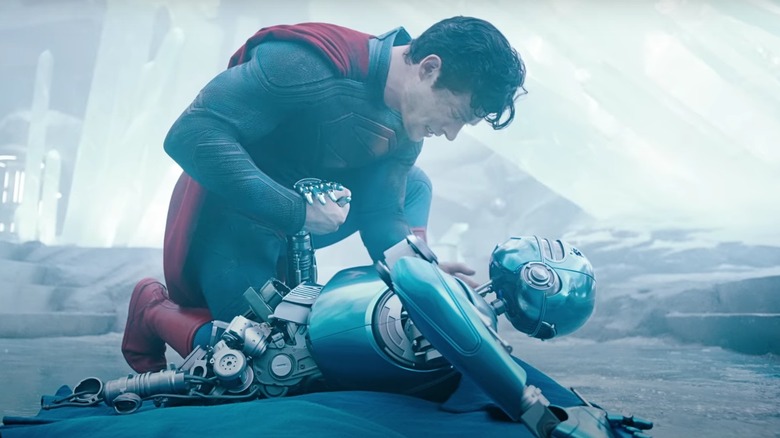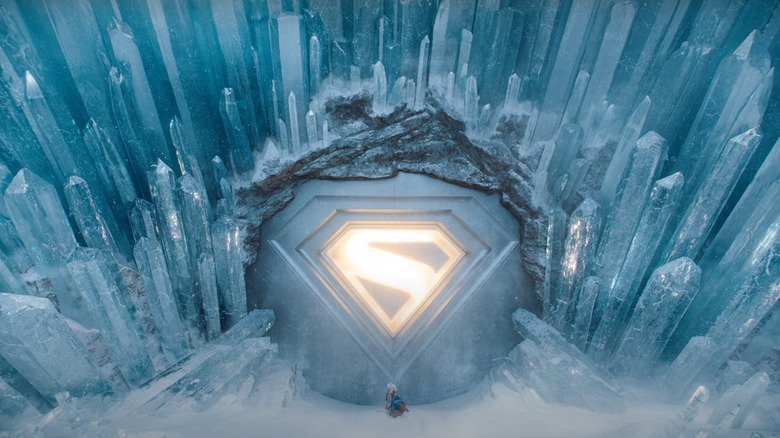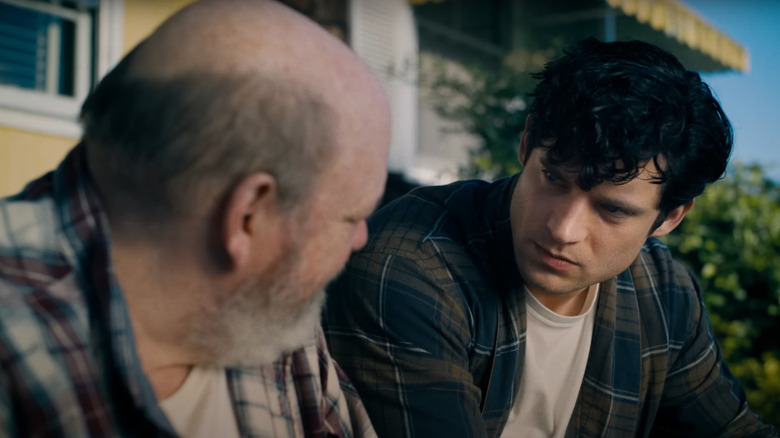James Gunn's Superman Movie Makes A Controversial Change (But It's Not The First Time)
This article contains major spoilers for "Superman."
Superheroes have existed as a genre unto themselves for nearly a century, so naturally, they've undergone storytelling permutations. There's a big difference between the open-hearted sincerity of the Golden Age of comics and the postmodern deconstructionist likes of "Watchmen," the "Dark Knight" trilogy, and "Man of Steel." For the first few decades, the character of Superman was a reliably stalwart bellwether of Good. If he happened to waver from that path temporarily, it was usually some form of Kryptonite that was to blame, and not any character flaw. In Richard Donner's 1978 "Superman," not only was Kal-El (played by Christopher Reeve) portrayed as a true blue guy who never lies in a post-Watergate and Vietnam America, but his parents Jor-El (Marlon Brando) and Lara (Suzannah York) are depicted as pseudo-religious figures, the literal last people on their entire planet to both speak the truth and be wholly selfless. It makes for an easily understandable explanation for why Kal-El turns out the way he does (not to mention his being raised by another set of equally good-hearted parents in Smallville, Kansas), allowing the film to get on with the business of introducing other elements, such as making Superman look like he's actually flying.
James Gunn's "Superman" doesn't have the burden that Donner's film did. With nearly 50 years of superhero cinema behind it, "Superman" 2025 is in a rare spot to cherry-pick from decades of both cinematic and comic book lore in its version of the character, and pick it does. The movie throws together oodles of bits and pieces of past "Superman" ventures, from John Williams' theme from the '78 film to the rom-com vibe of TV's "Lois & Clark." Yet Gunn makes a series of new, bold choices in the movie, the most controversial of which is that Jor-El (Bradley Cooper) and Lara (Angela Sarafyan) are revealed to have less than idealistic reasons for sending Kal-El (David Corenswet) to Earth. It's a shocking revelation, though not for the plot twist itself, as a version of it has appeared in prior Superman media. It's all in how Gunn uses the twist and commits to it that makes its appearance in "Superman" so controversial and compelling.
'Superman' borrows a plot point from the comics and 'Smallville' and takes it further
Superman's Kryptonian birth parents are typically depicted as benevolent figures, but that changed thanks to writer John Byrne's 1986 comic book miniseries "The Man of Steel," revamping Superman's origin to involve a more eerily alien and coldly distant Jor-El and Lara. That series ended with Superman choosing to embrace his human upbringing over his Kryptonian heritage, leaving him carrying the knowledge of the extinct Kryptonian race. In Mark Waid's 2003 limited series "Superman: Birthright," Superman gets to share a brief moment with his birth parents before Krypton explodes. While Superman's general lack of knowledge of his past helps him favor Earth over Krypton, the question of embracing his heritage is dealt with metaphorically by the series' take on Lex. He's revealed to have come from Smallville, Kansas, along with Clark, but he refuses to acknowledge it, choosing instead to try and fool humanity into believing that Krypton is an evil alien conquering race, a plot which Superman foils, of course.
The revelation about Superman's parents in Gunn's film essentially combines elements of Byrne and Waid, along with the Donner movie and a plotline from TV's "Smallville" series. In the latter, a teenage Clark (Tom Welling) must deal with interpreting the personality and intentions of Jor-El, because the man was only able to transfer his brainwaves to an AI that was sent with Kal-El to Earth. At one point, it was thought by Clark and other characters that Jor-El had sent his child to Earth to conquer it, only to discover that it was more the wishes of this AI version of Jor-El rather than those of the long-dead man himself.
This concept is referenced in Gunn's film by the plot point of Superman having a short video message stored in the Fortress of Solitude as his only connection to Jor-El and Lara. During his upbringing on Earth, Kal-El/Clark used the video as a totem, soothed by the notion that his birth parents saved his life out of love, as seen in the clip. Later, Lex and his posse invade the Fortress, and The Engineer (María Gabriela de Faría) finds a way to unlock the rest of the message. Lex releases the message to the media, wherein Jor-El and Lara state in the footage that they sent Kal to conquer Earth as the Last Son of Krypton, Superman assumes it's Luthor's trick, something the audience assumes, too. But the message is legitimate, forcing Superman to face some hard truths about his parentage as well as what kind of man — let alone metahuman — he wishes to be.
Kal-El's family issues feed into Gunn's central themes, and allow for a multi-dimensional Superman
Kal-El's birth parents having contemptible intentions for Earth seems deconstructionist or even controversially out of character on paper, but Gunn is not merely looking to shock or stir things up. Instead, the twist acts as a perfect encapsulation of the film's themes of being your own person and choosing to do the right thing, even if it's unpopular. Gunn's take on Kal-El is a continuation of themes from throughout his career, but particularly those seen in his "Guardians of the Galaxy" trilogy. In those films, several characters who make up the titular team of space heroes have severe issues with their families. The notion of characters with complex, mercurial morality has turned up in Gunn's films before as well, not just with Nebula (Karen Gillan) in "Guardians," but also with the titular Peacemaker (John Cena), and, yes, even "Superman."
Gunn is willfully playing with genre tropes and subsequent audience expectations, but the film doesn't boil down the conflict within Superman to Good parents vs. Evil parents. Instead, the entire movie revolves around Kal-El/Clark/Superman's evolving ideas about who he is, who he wants to be, and what he wishes to contribute to the world. His Earth parents, Pa and Ma Kent (Pruitt Taylor Vince and Neva Howell), aren't depicted as saints; they're just honest, salt-of-the-Earth types whose advice for Clark is not to follow in their footsteps, but to take the tools they've given him as parents and forge his own path. This idea is just as radical (or "punk rock," as the film would have it) for Superman as the Kryptonian message is. Most versions of Superman see him actively attempting to honor the wishes of his parents, usually both sets of them. This version of Superman is all about giving the character the freedom of choice, something far more American at its core than any preconceived "values."
This helps make this Superman a multi-dimensional character without having to resort to anything as histrionic as his snapping the neck of a foe. People who have a good relationship with their families can take pride in Clark's love of his Kansas parents, while those who find strength in their found families or simply themselves can relate to how Kal-El goes his own way, unburdened by his problematic past. If the 1978 film was pointing out the value of integrity in a nation that had lost it, and 2013's "Man of Steel" questioned authority and responsibility, then 2025's "Superman" is for our current isolationist age.
We don't have to mindlessly obey the wishes of our elders; we have the freedom to think for ourselves, and the choice to help others is available to all of us.


